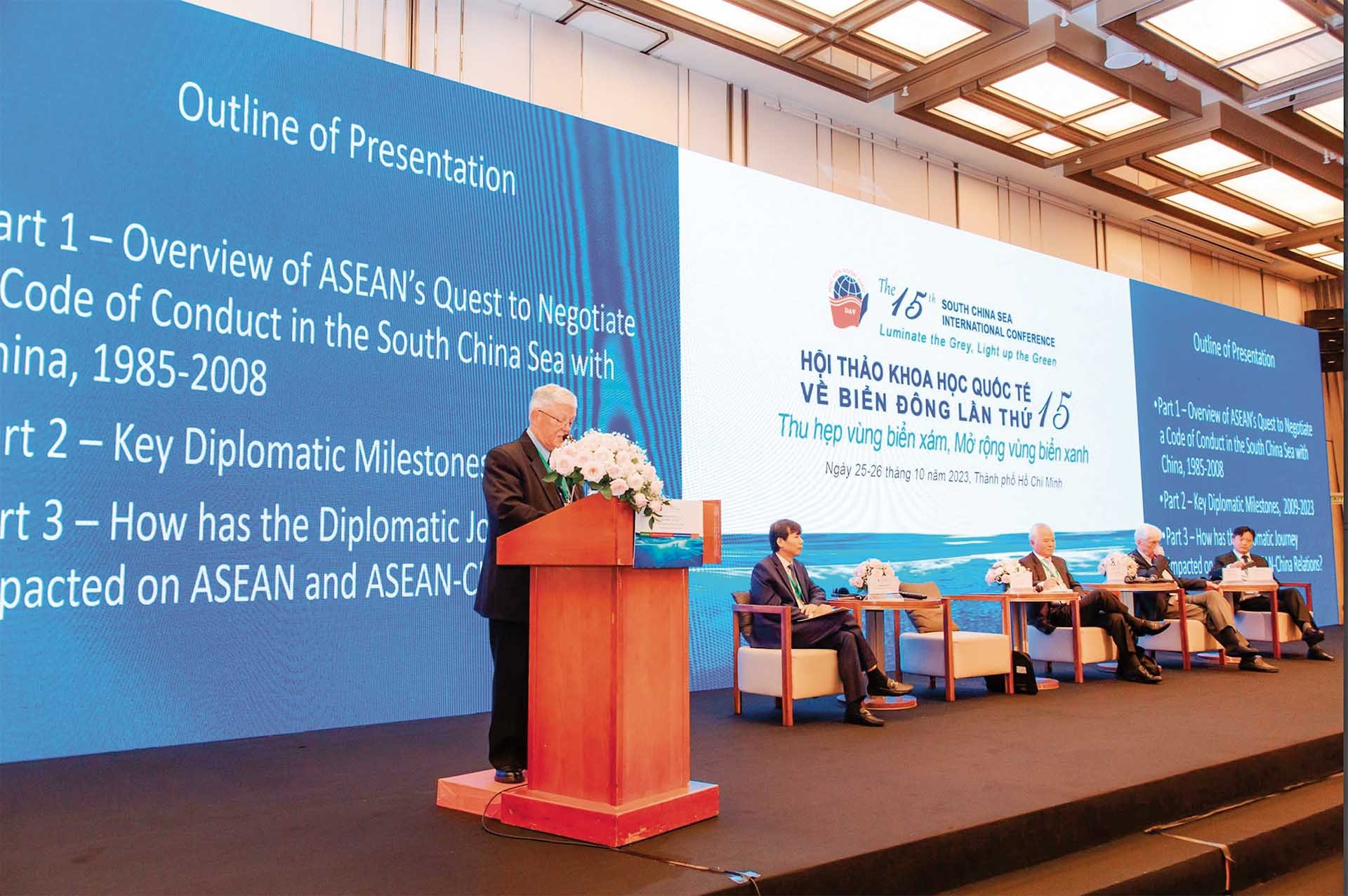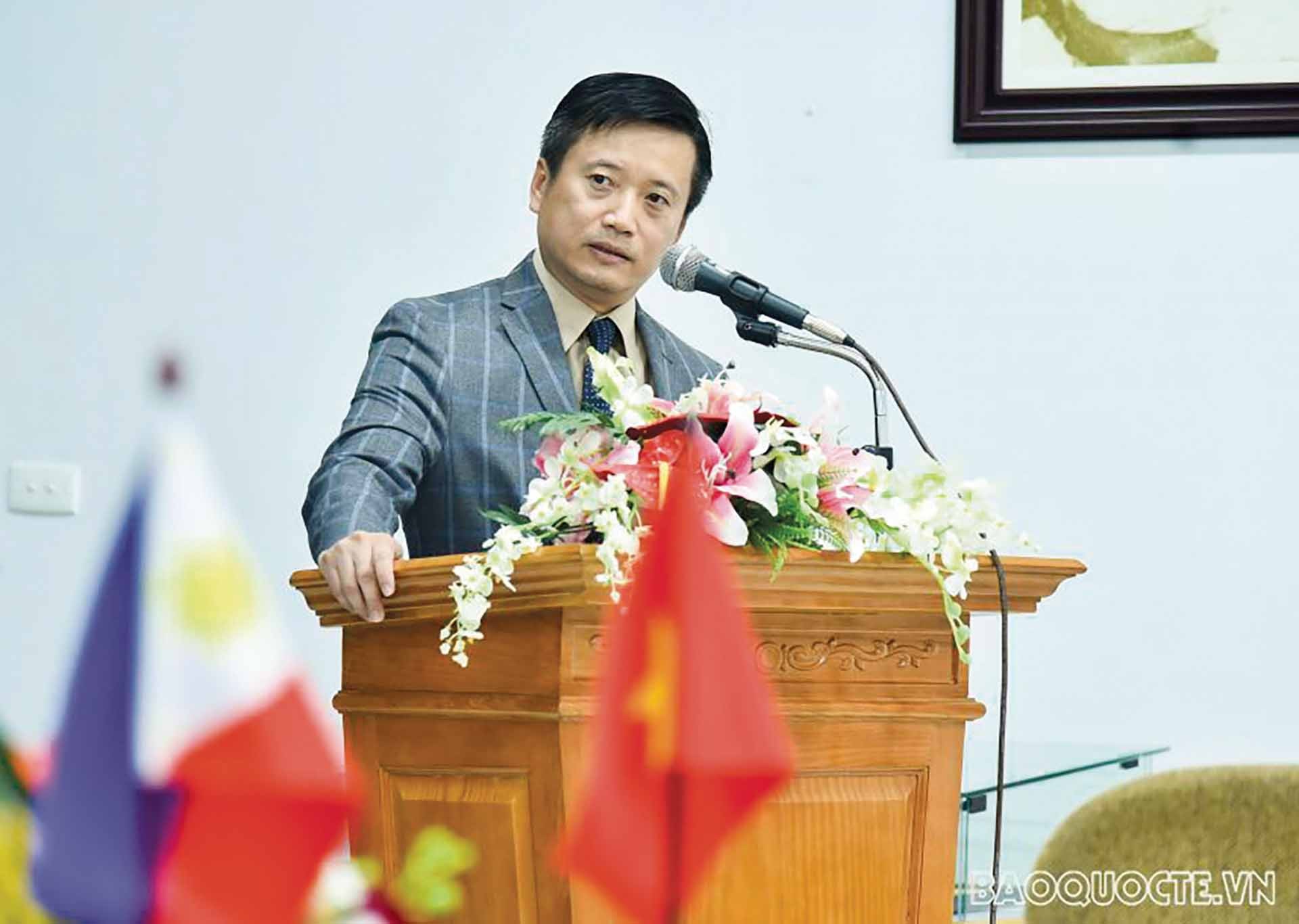
‘Track 2 Diplomacy’ proactively reaching out to the region and the world
Latest
 |
| International conference on the East Sea draws the presence of leading experts in the region and the world. |
What do the Shangri-La Dialogue (Singapore), Munique Security Forum (Germany); Xiangshan Forum (China); Asia-Pacific Roundtable (Malaysia); Jeju Forum for Peace and Prosperity (South Korea); The Raisina Dialogue (India), Halifax International Security Forum (Canada), International Conference on the South China Sea (aka East Sea, Vietnam) have in common? These represent significant annual gatherings categorized as Track 1.5 and Track 2 Forums, strategically employed by nations to influence and shape international public opinion, particularly on challenging and emerging issues.
Today’s quasi-official diplomacy trends
A nation’s diplomatic engagements can be conducted through government officials, or alternatively, by non-governmental actors like scholars and experts or even government officials themselves acting in their private capacity. These individuals may wield influence and prestige, impacting the policymaking process directly or indirectly. These semi-official endeavors are commonly termed as “Track 2” or “Track 1.5” diplomacy.
Given that a country’s policy-making process extends beyond the government apparatus, quasi-official diplomacy exerts influence by strategically engaging with different aspects and participants in the policymaking process. This involves activities such as sharing information, offering analyses, evaluations, and recommendations to directly shape the narratives or the perspectives of involved stakeholders. The common characteristic of quasi-official diplomacy lies in its lack of constraints imposed by diplomatic rituals, policies, and official positions. Consequently, quasi-official diplomatic tracks enjoy a broader and more flexible platform to articulate opinions, particularly on sensitive matters, and have the latitude to explore and test new ideas.
Quasi-official diplomacy is gaining popularity in the current context due to its ability to mitigate risks when nations grapple with challenging issues amid rapidly evolving circumstances, where perceptions, opinions, and established rules or institutions may undergo changes. There are numerous instances where quasi-official diplomacy has proven effective, particularly in initiating new ideas, the formulation of new cooperation frameworks, and the mediation and reconciliation of international conflicts. Consequently, many middle powers have maintained “Track 2” or “Track 1.5” forums in order to bolster their global views and influence.
Vietnam proactively integrate to regional and international quasi-official diplomacy network
As the primary agency for strategic research, development, and training under the Ministry of Foreign Affairs, the Diplomatic Academy of Vietnam has taken a proactive, affirmative, and innovative stance in the realm of “Track 2 diplomacy,” actively contributing to the realization of the Party and State’s directives and policies on foreign affairs. Its dynamic contributions include playing a pioneering role, particularly in the early identification of opportunities and challenges, safeguarding the homeland from the outset, and contributing to the establishment of a comprehensive, professional, and modern foreign affairs and diplomacy framework.
With close to 80 signed Memorandums of Understanding (MOUs) and an extensive network of partnerships with strategic research agencies worldwide, the Diplomatic Academy serves as a crucial instrument in executing research and projects aligned with the Ministry of Foreign Affairs’ strategic goals. Consistent dialogues and exchanges with prominent experts from various countries and regions facilitate the Institute for Strategic Studies and the East Sea (South China Sea) Institute in promptly understanding and accurately evaluating emerging issues and policy trends in major powers, middle powers, and regional counterparts.
Functioning as the hub for Vietnam’s “Track 2” diplomatic engagements, the Diplomatic Academy has played a vital role in facilitating connections between domestic experts and research institutions with “Track 2” initiatives across the globe. Through this engagement, it assists domestic agencies and other stake holders in comprehending regional and global trends, enabling them to contribute Vietnam’s views and perspectives on emerging international issues, shapes international public opinion.
In recent years, the Diplomatic Academy has emerged as a frequently visited venue by diplomatic corps and foreign dignitaries, including high-ranking officials. These interactions involve policy exchanges and the conveyance of messages. This serves as a significant “window” for the Academy to share perspectives and actively contribute to influencing and shaping the viewpoints and policies of partners on relevant issues.
 |
| Dr. Nguyen Hung Son, Deputy Director of the Diplomatic Academy. |
A pioneer in shaping regional dialogue and cooperation
An increasingly positive role played by Vietnam’s “Track 2 diplomacy” in shaping and influencing the external environment is the initiation and establishment of reputable regional and international forums addressing significant emerging regional and global issues. Some notable forums include the following:
- International Scientific Conference on the South China Sea dedicated to transforming the East Sea into a sea of connection and cooperation. With 15 years of continuous organization, this forum has evolved into a credible and respected regional and international dialogue, serving as an essential gathering point for top experts in the realm of regional security issues.
- Ocean Dialogue, a platform for in-depth discussions on emerging marine and oceanic issues. Thus far, 11 dialogues have been conducted, covering diverse topics including the 1982 UN Convention on the Law of the Sea, climate change, rising sea levels, offshore wind power, and more.
- Mekong Forum with the aim to foster dialogue and collaboration across various sectors concerning the Mekong sub-region, the objective is to enhance cooperation in the sustainable utilization of Mekong River water resources and address pertinent non-traditional challenges effectively.
- International Sinology Symposium serves as a platform to unite experts in China studies from diverse countries and fields. This forum leverages varied strengths of a wide pool of global Sinologist to facilitate a deeper understanding of contemporary China. Simultaneously, it aids China in comprehending global perspectives and expectations toward the nation.
These forums play a pivotal role in fostering dialogue, cultivating trust, promoting collaboration, and influencing regional and international approaches to critical issues. Their endeavors are closely aligned with the national and people interests of Vietnam.
Actively contribute to building a professional, comprehensive, and modern Vietnamese diplomacy
Confronting swift and profound shifts in the global landscape, the Diplomatic Academy will persist in actively engaging at the regional and international levels, aspiring to establish itself as a reputable research, training, and development institution on a global scale and within the region.
The Diplomatic Academy will persist in actively engaging in regional and international “Track 2 diplomacy,” leveraging international networks and specific advantages to enhance strategic research and forecasting. The Academy will further establish and develop esteemed international forums, partake in “leading and shaping” regional dialogue and cooperation mechanisms, and facilitate connections between domestic and foreign experts to explore and propose innovative cooperation ideas.
Furthermore, the Diplomatic Academy will take the forefront in theoretical research on Vietnamese diplomacy, adeptly integrating theoretical insights with the training and development of the nation’s foreign affairs personnel to not only grasp the policies of the Party and State but will also acquire practical Track 2 foreign policy experience during their undergraduate.
With a rich tradition spanning over 65 years and dedicated support from the Ministry of Foreign Affairs, the Diplomatic Academy of Vietnam is poised to continue making significant contributions towards the development of a professional, comprehensive, and modern Vietnamese diplomacy!









